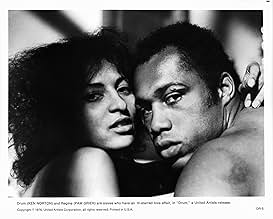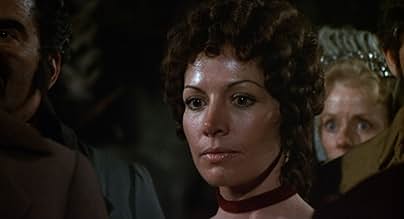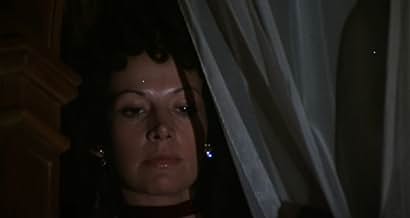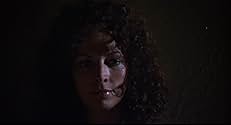IMDb RATING
5.5/10
1.2K
YOUR RATING
A mid-19th-century mulatto slave is torn between his success as a pit-fighter and the injustices of white society.A mid-19th-century mulatto slave is torn between his success as a pit-fighter and the injustices of white society.A mid-19th-century mulatto slave is torn between his success as a pit-fighter and the injustices of white society.
- Directors
- Writers
- Stars
Cheryl Smith
- Sophie Maxwell
- (as Rainbeaux Smith)
- Directors
- Writers
- All cast & crew
- Production, box office & more at IMDbPro
Featured reviews
After reading all the reviews about this film, I was expecting either a sleaze-fest or a camp-fest (or both), but I was pleasantly (?) surprised. Although there are undeniably exploitational elements here (incest, castrations, torture), the director doesn't really linger over them. Nobody would mistake this for a thoughtful study on the mistreatment of black slaves in early 19th-century America, but it's a surprisingly well-made film, and the recreation of the period is just fine. The major weakness of "Drum" is that the male lead, Ken Norton, simply can't act; thankfully, Warren Oates and Yaphet Kotto certainly can. Pam Grier is wasted, however, and Colicos is positively ludicrous as a gay slave-trader. (**1/2)
I got a copy of it from one of those "avant garde" type video shops that pride themselves in having the hard to find stuff.
You can see this movie without having seen the pre-quel,"Mandingo" and not lose much understanding, since they make almost no references to what happened in the first movie. In fact, the plantation owner's white daughter was not in the first movie, so it really doesn't follow at all (she was in the novel "Mandingo"). Those who thought Mandingo was trashy will really be howling when they see this one....Warren Oates and the woman playing his daughter play for laughs in the middle part of the movie...(that actress went on to make X-rated movies and then dropped out of acting altogether by the mid 80s). John Colicos plays an evil homosexual....I like the overdone white trash talk though (" OH PAW! You ain't gonna marry that uppity bitch!) Great camp. Ken Norton acts like a mannequin most of the movie.....(" He might kill Blaize...or even worse, castrate him" - said with a totally expressionless face). And the dinner conversation is hilarious. ("Son I gonna give you Regine. How long you figger it take you to knock her up?). (" Miss Augusta, you jes got to get used to the fack that Falconhurst is all about n****r fornicatin'. If'n my n****rs stop fornicatin', we stops eatin'.)
Regine: You likes big titties, don't you Mistah Maxwell?
Hammond: Oh you knows I likes big titties.
Regine: Well Miss Augusta, she got BIIG titties.
And I repeat - this is supposed to be a serious movie.
The movie is in that "so bad it's good" category. Check it out, if you have a hankerin' for that genre.
You can see this movie without having seen the pre-quel,"Mandingo" and not lose much understanding, since they make almost no references to what happened in the first movie. In fact, the plantation owner's white daughter was not in the first movie, so it really doesn't follow at all (she was in the novel "Mandingo"). Those who thought Mandingo was trashy will really be howling when they see this one....Warren Oates and the woman playing his daughter play for laughs in the middle part of the movie...(that actress went on to make X-rated movies and then dropped out of acting altogether by the mid 80s). John Colicos plays an evil homosexual....I like the overdone white trash talk though (" OH PAW! You ain't gonna marry that uppity bitch!) Great camp. Ken Norton acts like a mannequin most of the movie.....(" He might kill Blaize...or even worse, castrate him" - said with a totally expressionless face). And the dinner conversation is hilarious. ("Son I gonna give you Regine. How long you figger it take you to knock her up?). (" Miss Augusta, you jes got to get used to the fack that Falconhurst is all about n****r fornicatin'. If'n my n****rs stop fornicatin', we stops eatin'.)
Regine: You likes big titties, don't you Mistah Maxwell?
Hammond: Oh you knows I likes big titties.
Regine: Well Miss Augusta, she got BIIG titties.
And I repeat - this is supposed to be a serious movie.
The movie is in that "so bad it's good" category. Check it out, if you have a hankerin' for that genre.
Drum, in my opinion, was much more enjoyable than Mandingo. It's more an action film than a drama. Ken Norton gets to say more dialogue, even though he's still no actor. The big plus for Drum is that it's not as long as Mandingo. The cast delivers very bizarre performances, including John Colicos as Drum's evil gay ex-boss, and Warren Oates does well as Hammond Maxwell, although he doesn't have the same wickedness that Perry King portrayed him with in the first film.
The final showdown, with the battle between black slaves and rich white people, plus the burning mansion, goes to show that there were some slaves in those days who were mad as hell and weren't gonna take it anymore!
Rating: ***
The final showdown, with the battle between black slaves and rich white people, plus the burning mansion, goes to show that there were some slaves in those days who were mad as hell and weren't gonna take it anymore!
Rating: ***
People seem to miss the point of certain movies on many occasions, forgetting that there isn't just one kind of film or method to express ideas in the form of storytelling. Drum is a film that many have labeled as sick, disgusting, homophobic, racist, over-the-top, camp etc. True, these are feelings that are intensely aroused when watching this film. However, one seems to quickly forget, that real life itself can be sick, disgusting, homophobic, racist, over-the-top, camp etc. Are we to curse a movie that chooses to express itself through such 'truths'? Drum has a unique, uncommon (and gathering from the critical reactions) unpopular form of subjective and objective points of view that greatly disturb the viewer to the point he cannot handle it. Most people want stories where they can root for the hero. One complaint about Drum (Maltin review) is one cannot empathize or vicariously experience the forces that are bombarding the hero from his unique pov. This, I do agree, but why is that a perquisite for every story that must ever be told? The filmmakers may or may not have wanted such an outcome, but, as the way it stands now, because we can't see or root for simple cathartic releases through the main character, we, the viewers, are forced to reckon with those dark forces head on. All the scenes of racism and abuse by slave owners (either a product of their culture or out of economic necessity) and the wickedness of bored women enjoying the wealth of such economic exploitation are scenes that surely happened back in the day, if not exactly, at least in spirit. We the audience are thus viewing the film as close as you can from a documentary-like, objective point of view. (The director of this film is a noted still photographer who started out in film making documentaries. Still photographers, including Stanley Kubrick, are known to seem detached, cold, as they study and present their characters and their behavior as though watching it from a test tube. Fincher and Cronenberg continue this tradition). Watching Drum from such an objective stance, leaves the audience nothing to fall back on, since the film is not making it easy for the audience to get lost in the main character etc. One gets the sense of being suddenly transplanted into this depraved hell in history, helpless. The viewer is exposed to repulsive human beings whose philosophies are so deluded, so disgusting. I.e the French Slave Trader and even the Warren Oates character (who believes throughout the story, that it is the white blood in the younger generations of slave, that is making them a little human, and therefore act in a savage way! What absurd logic! To this man, when the slave was first removed from Africa he was seen as completely savage, but yet somehow good and docile and therefore a good slave at the same time??? If a little white blood suddenly wakes up the beast, what does it say about someone who is a 100% white, as is the Warren Oates character. We are never able to ask him this question, and neither do the filmmakers. They leave us to figure it out for ourselves as Warren Oates repeats his frustration and confusion at the end of the film. We know his character believes that anyone who is 100% white is noble, civilized and far from savage. So where does this train of thought of white pollution being the cause of savagery come from? This hypocritical man, of philosophical contradiction and paradox is a fine example of man at his most 'rational' worst. When the mind fails at logical thought, when the psyche is damaged, or giving in to maybe contradictory primal, bodily forces (to survive, kill, gather resources). These are men whom are 'blessed' with only a little knowledge, and therefore highly dangerous. This is the same kind of psychological handicaps, delusions, that kept the Nazi machine running so fast and furious for as long as it did. When characters seem to be so ignorant in Drum, speak innate dialogue, behave over-the-top, campy etc., they do so, because that is in fact who they are!!! In portraying the uneducated, racist, sick, ignorant lowlifes as they way they really would act in their natural surroundings, the audience is stunned! (We don't love them the way some of us do with the neo-hip Tarantinoesque lowlifes or Hannibal scum that fill the films of today! (What is better I ask, to watch Hannibal or some Tarantino character and be entertained and amused, even turned on by their sickness or to watch Drum and be truly sickened by true sickness????!!!)The audience has been doused with cold water and it is they who can only dry themselves. The slave trade was an ugly terrible time in America History. And any dramatic representation of it should be just as equality sick and disgusting. When you watch Rambo, you feel better about Vietnam. Now that is dangerous. If you watch Drum, you feel sick, as you rightfully should be. Back to the subject of subjective and objective points of view. No film is entirely subjective or objective. Most films present the action unfolding as objective, with a tone of subjectivity (that being the point of view of the main character or hero) We see the world on screen as we do in reality (objective) with a sense (tone) of how hero looks at it (subjective) - which will now become our tone, our point of view. In Drum, we are given the world as we would have seen it back then, in very heavy doses. The objective is strongly emphasized. Because, Drum, the character is so insignificantly developed or expressed, we are very light on his point of view. So the tone of the film shifts from his weak to nonexistent point of view to the points of views of other more intensely captivating, disturbing, interesting characters. Drawn to them by default, (it's the audience instinct in us to latch on to a character and variously walk in his shoes), we become subject to their point of view. The subjective POV and tone is then that of the racist scum. This is why we are revolted and shocked by what we're seeing (or more importantly, what we are feeling). For we are feeling what it is like to be a racist scum, we are propelled into our own dark souls where the capacity for such similar evils exist. We do not want to consciously acknowledge this terrible fact, that we can be monsters too. We instead want to suppress such urges or potentialities by experiencing stories that hide such facts and give us a cheap escape through the feeding of the hunger in our souls to be evil. Entertainment is the great sedating pill for man's darker side during peacetime (During wartime, when we are indirectly or directly killing, we want good time comedies, musicals, etc., to counterbalance the bad). In fact, even Drum is guilty of trying to achieve this kind of cathartic cop-out. When the slaves revolt and destroy the slave-owners, we are once again given the Rambo route. And when the film ends, we do not know if Drum escapes or not. This thus sells us hope. But, hope works well, is even needed, when it is directed towards our unknown futures. The hope sold cheaply in Drum is disturbing as the film concerns history, and we know the outcome. Most slaves, never revolted and most never escaped. They suffered greatly and died horribly.
Ha ha ha ha .....this movie was out there. Okay i'm a 31 year black male and a movie buff.I like movies good and bad, but a really love campy movies. Drum is now my favorite movie on all time!!!! The acting was terrible, the direction was worst,but i loved it!!! The plantation owner and his slutty daughter were the most outrageous characters in the entire movie...i love slavery movies or any movie set in the antibellum south..i saw mandingo and loved it!!!...i didn't even know drum existed until i saw it on late night cable tv. It was explicit,funny and probaly insulted half the viewing population! It was WILD and most of all POLITICALLY INCORRECT..WHICH IS WHAT FILMMAKING SHOULD BE!!!!!Most black people who watch this movie will probally laugh there ass off, I did! Those people who were offended, cool out. Its just really a fun movie.
Did you know
- TriviaThe "Falconhurst" novel series of books are (in order of publication): Mandingo (1957), Drum (1962), Master of Falconhurst (1964), Falconhurst Fancy (1966), The Mustee (1967), Heir to Falconhurst (1968), Flight to Falconhurst (1971), Mistress of Falconhurst (1973), Six-Fingered Stud (1975), Taproots of Falconhurst (1978), Scandal of Falconhurst (1980), Rogue of Falconhurst (1983), Miz Lucretia of Falconhurst (1985), Mandingo Master (1986), and Falconhurst Fugitive (1988).
- Quotes
Regine: And titties! You likes big titties, don't ya?
Hammond Maxwell: Oh, you know I loves big titties.
- ConnectionsFeatured in Warren Oates: Across the Border (1993)
- How long is Drum?Powered by Alexa
Details
Contribute to this page
Suggest an edit or add missing content























